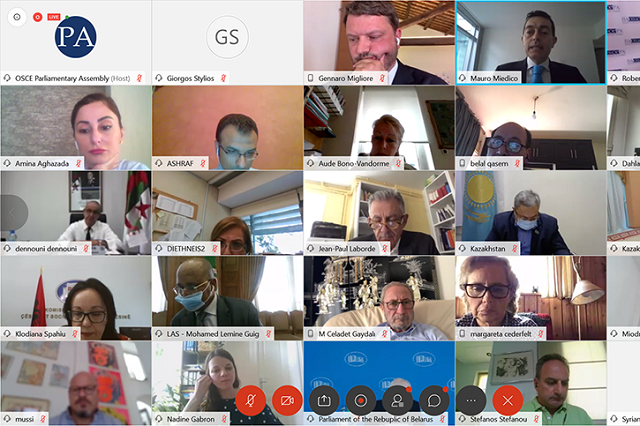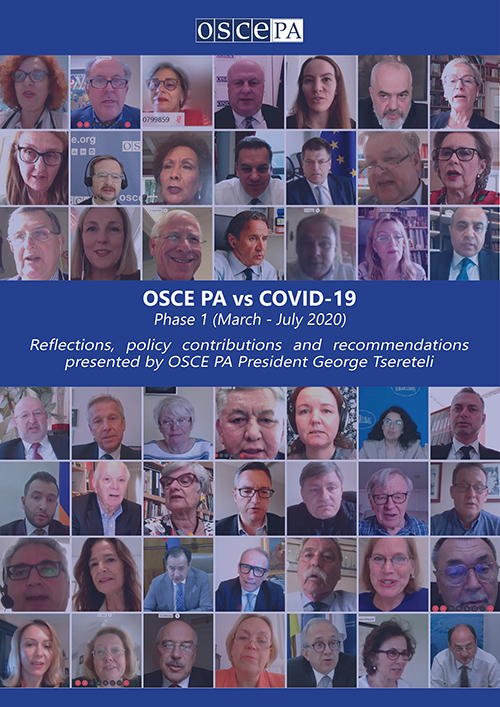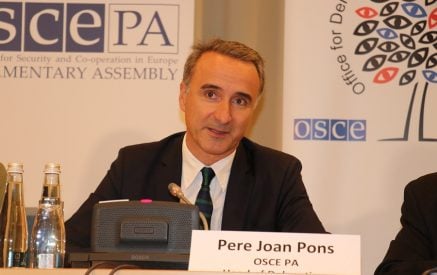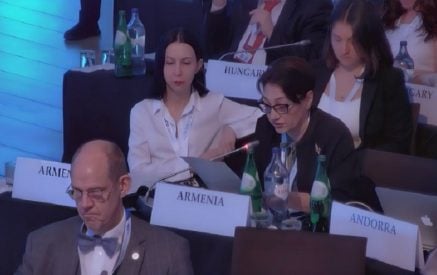COPENHAGEN, 13 July 2020 – The COVID-19 pandemic, as an unprecedented global crisis that impacts all dimensions of security, has underlined the urgency of addressing long-standing challenges facing the OSCE area, including resolving conflicts, promoting environmental sustainability, managing migration, and ensuring democratic resiliency and social cohesion, a new OSCE Parliamentary Assembly report concludes.
“OSCE PA vs. COVID-19: Reflections, policy contributions and recommendations presented by OSCE PA President George Tsereteli” is the product of eight Parliamentary Web Dialogues from March-June 2020 dealing with subjects relating to the pandemic’s effects on conflicts in the OSCE area, economic and environmental impacts, human rights and democratic governance, counter-terrorism, gender issues and more. It features the observations of dozens of experts and parliamentarians who contributed to the events, pointing out that governmental and parliamentary actions during this period will have long-term consequences for public trust in institutions.
In presenting the report today, OSCE PA President George Tsereteli (Georgia) noted that during the COVID-19 crisis, parliamentarians have played an essential role as a link between citizens and their governments, as well as providing oversight of governments’ actions, promoting good governance and preventing corruption, and by enhancing dialogue on the international level.
“Faced with the need to provide a global response to this global crisis, the OSCE PA has encouraged close co-ordination with parliaments at the national and the international levels to promote democratic, effective, and coherent public policy responses, and to address our citizens’ concerns,” writes Tsereteli in an introduction to the report. “In the post-COVID era, we are invited to make the full use of our parliamentary prerogatives, in particular oversight.”
Read also
Among the report’s key findings:
- The COVID-19 crisis and its indirect effects can have a heavy impact on conflict-affected populations already enduring precarious conditions: the closure of crossing points or entry-exit checkpoints, reduced access to healthcare and economic difficulties place a heavy burden on vulnerable populations.
- With governments preoccupied with COVID-19 challenges, issues of ongoing conflicts are slipping from the international agenda and lockdown measures introduced by countries have slowed down international conflict mediation efforts and peace negotiations.
- The pandemic is pushing both advanced and emerging economies into a recession, severely impacting the lives of millions of citizens. The worst affected economies seem to be those that are most integrated into the global supply chains.
- The links between air pollution, which disproportionately affects low-income and minority communities, and increased health risks associated with COVID-19 are clear. The severe health implications brought on by inadequate environmental protection should lead to legislative initiatives to safeguard public health through direct public support towards green projects, green finance and higher carbon pricing.
- Restrictions put in place on fundamental freedoms and economic activity must be limited in duration, proportionate, consistent with legal obligations, and non-discriminatory. Legislative bodies should continue their functioning to the highest degree possible.
- Electoral processes may need some adaptation of procedures in order to proceed safely during a pandemic. Proceeding with elections immediately may stress untried procedures and result in limited and unfair opportunities for campaigning and/or for voting.
- The pandemic has revealed many alarming systemic inequalities resulting from marginalization, discrimination, racism, and xenophobia, with serious shortcomings in policies.
- Some minority communities have been disproportionately targeted by the police, and the pandemic has been used to justify harsher measures against migrants and refugees. Women also appear to be disproportionately affected by the pandemic.
- The pandemic highlights the exceptional exposure of refugees, asylum seekers and migrants across the OSCE region, in particular women and children, adding to their vulnerabilities due to poor living conditions, and limited access to health and hygiene services.
- While the long-term impact on terrorism is yet to be fully comprehended, the uncertainty caused by the pandemic is likely to trigger dangerous dynamics and fuel violent extremism throughout the OSCE region.
- An enormous amount of false and misleading information related to the COVID-19 pandemic, including misleading healthcare information, conspiracy theories, fake claims about vaccines, bogus cures, and medicines have resulted in the spread of panic, confusion, and distrust.

Parliamentary Web Dialogue “Countering Terrorism and Violent Extremism amidst the COVID-19 Pandemic” – 30 June 2020
The report recommends that combating disinformation must be a common effort of OSCE participating States’ competent authorities, civil society, social media platforms, and international organizations. Governments should also monitor trends and share assessments on how extremist groups are exploiting COVID-19, and thus consolidate national, regional, and international policy and legislative strategies in this domain.
Comprehensive responses to the effects of the health crisis require the collection and analysis of data disaggregated by gender, race, indigeneity, sexuality, age, disability, socioeconomic status and migratory status, according to the report. Refugee and migrant communities must be an integral part of any public health response and COVID-19 prevention measures should not stigmatize these communities.
Parliamentary oversight and transparent legislative procedures are particularly important under the current circumstances, the report concludes. Parliaments should play an important role in shaping both immediate responses as well as longer-term solutions, and parliamentarians have a unique role and ability to bring a human rights perspective into their work and legislation.
The pandemic should also provide momentum for developing and implementing green economic recovery plans throughout the OSCE region, as well as balanced fiscal, monetary, and financial market measures to mitigate the economic and social impact of the crisis.
“The COVID-19 pandemic is much more than a health emergency: it impacts on the security of our societies and citizens, which are at the core of the OSCE’s focus,” OSCE PA Secretary General Roberto Montella writes in an introduction to the report. To address the crisis effectively, “we need to maintain unity among international actors, avoiding duplication of efforts and investing in each other’s added values to prove that only effective multilateralism will bring about concrete solutions to the current crisis.”
The 35-page report is available here.
For more on the OSCE PA’s response to COVID-19, including all videos of the Parliamentary Web Dialogues, as well as related op-eds and media interviews, please click here.
OSCE PA























































